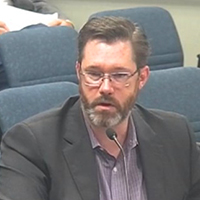
Texas regulators are grappling with writing weather preparedness measures for generators and transmission service providers as required by state law, a task that sounds easy enough until put into practice.
Several factors are hampering the Public Utility Commission’s work. There’s a required, in-depth study of extreme weather scenarios that is not expected to be completed in time to meet the commission’s Dec. 1 deadline for a final rulemaking.
There’s also a pending federal regulatory standard for generators that’s still almost two years away. And then there’s the harsh reality that not all generating units run or are operated the same way, a complication when writing a weatherization rule for a fleet with tens of thousands of individual units.

Barksdale English, the PUC’s director of compliance and enforcement, said Thursday that staff’s draft rulemaking is procedurally on track, although the short implementation deadline is a “big challenge.”
“We have six months to write a rule the commission has never taken up before and that it has never regulated,” English told the commissioners during a PUC work session on weatherization.
He said the proposed rule will tackle the statutory requirement that generators be prepared to operate during a weather emergency. “We have to think about what a reliability standard is, what it means to be prepared to operate during extreme weather,” he said.
According to the draft rule, ERCOT must conduct the weather study and include statistical probabilities for a range of weather scenarios in the 95th, 98th and 99th percentile probabilities. The study must address a comprehensive range of weather scenarios and must include minimum parameters for high and low temperatures, wind, humidity, precipitation and duration.
Generators must comply with either a basic or “enhanced” weather reliability standard. The basic standard requires a generator to maintain preparation measures that “reasonably ensure” it can operate at its rated capability, as defined by ERCOT under the 95th percentile of each of the weather study’s four extreme scenarios. The enhanced standard raises that threshold to the 98th percentile.
Separate standards are included for new generators and black start providers. Each generation entity is required to submit to ERCOT a study that confirms compliance with the standard and to also file an annual report to the grid operator. ERCOT must develop an inspection program that ensures each resource is inspected at least once every three years.
This fall, ERCOT plans to conduct spot checks for “every plant that had problems” during the February winter storm.
Woody Rickerson, the grid operator’s vice president of grid planning and operations, said staff has noted improvements at plants that failed during a 2011 winter event. That storm led to legislative directives that were never followed up on.
“We did see improvement before 2021,” Rickerson said.
“The only thing is, we didn’t have anything on paper,” Commissioner Will McAdams said. “Once you have something on paper, that’s a different animal.”
Without a complete weather study, the commission agreed to draft an initial set of rules and then finetune the requirements once it has the weatherization data and analysis. The initial standard will apply to those generating units that failed during the 2011 and 2021 winter storms.
“Make a plan to fix those and execute that plan,” English said, noting ERCOT will gain regulatory authority from the new rule. “So actually prepare your facility. Don’t just tell me that you identified the problem, but do something about it.”
More than 30 entities have provided comments on the proposed rulemaking.
The work session was the first of six scheduled workshops as the PUC manages the work of turning legislation and political directives into grid protocols and requirements (51617). (See “Regulators Set Future Work Sessions,” Texas Public Utility Commission Briefs: July 15, 2021.)
Texas climatologist John Nielsen-Gammon and Chris Coleman, ERCOT’s meteorologist, set the stage with an informational discussion on the state’s climate. Thermal and renewable generation experts and natural gas industry representatives discussed weatherization best practices and their lessons learned.
Joseph Younger, the Texas Reliability Entity’s director of enforcement, reliability standards and registration, said NERC’s cold weather standard remains under development, but was filed with FERC on June 17. Assuming FERC approval of Project 2019-06 and its mandatory cold weather preparedness requirements, he said the standard would not become effective for another 18 months.
The project, initiated after the 2018 cold weather event involving SPP and MISO, requires generator operators to protect their units against freezing and share their cold weather operating parameters with regulators. (See NERC Board OKs Cold Weather Standards.)
“The 2021 event could be folded into the standard through a FERC directive,” Younger said.
“NERC has a knack of doing things just in time,” Commissioner Jimmy Glotfelty said in making his first official appearance on the PUC.
Glotfelty, co-founder of Clean Line Energy Partners and a former Department of Energy official, was appointed to the PUC on Aug. 6, giving the commission a fourth member for the first time. State lawmakers passed legislation earlier this year that increased the PUC’s membership to five. (See Abbott Names Glotfelty as 4th Commissioner on Texas PUC.)



